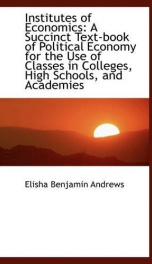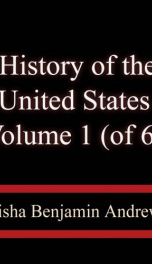Andrews Elisha Benjamin

Elisha Benjamin Andrews (January 10, 1844 – October 30, 1917) was an American economist and educator, born in Hinsdale, New Hampshire. He served in Connecticut regiments during the Civil War. Graduating from Brown University in 1870 and from the Newton Theological Institution in 1874, he preached for one year and then was president of Denison University from 1875-79. He was professor of homiletics at Newton Theological Institution from 1879-82; professor of history and political economy at Brown University from 1882-88; professor of political economy and finance at Cornell University from 1888-89; and he served as the president of Brown University from 1889 until 1898. He resigned as president of Brown in 1897 because of criticism by trustees of his advocacy of free silver but at that time withdrew his resignation. He was the superintendent of schools for Chicago from 1898 to 1900, and then became chancellor of the University of Nebraska in 1900. He retired from academic life as chancellor emeritus of the University of Nebraska on January 1, 1909. In 1892, he was an American commissioner to the Brussels monetary conference and was a strong supporter of international bimetallism. He became a member of the corporation of Brown University in 1900 and was made president of the Association of State Universities in 1904. Andrews died at his home in Interlachen, Florida in 1917. Andrews published many college textbooks on history and economics, including:
do you like this author?
What readers are saying
What do you think? Write your own comment on this book!
write a commentWhat readers are saying
What do you think? Write your own comment on this author!
write a commentBook list

the history of the last quarter century in the united states 1870 1895 volume
Series:
Unknown
Year:
Unknown
Raiting:
2.5/5
Show more
add to favoritesadd In favorites

the call of the land popular chapters on topics of interest to farmers
Series:
Unknown
Year:
Unknown
Raiting:
5/5
Show more
add to favoritesadd In favorites

institutes of economics a succinct textbook of political economy for the use of
Series:
Unknown
Year:
Unknown
Raiting:
3/5
Show more
add to favoritesadd In favorites
Book list

the history of the last quarter century in the united states 1870 1895 volume
Series:
Unknown
Year:
Unknown
Raiting:
2.5/5
Show more
add to favoritesadd In favorites

the call of the land popular chapters on topics of interest to farmers
Series:
Unknown
Year:
Unknown
Raiting:
5/5
Show more
add to favoritesadd In favorites

institutes of economics a succinct textbook of political economy for the use of
Series:
Unknown
Year:
Unknown
Raiting:
3/5
Show more
add to favoritesadd In favorites

institutes of economics a succinct text book of political economy for the use
Series:
Unknown
Year:
Unknown
Raiting:
3.5/5
Show more
add to favoritesadd In favorites

history of the united states from the earliest discovery of america to the prese
Series:
Unknown
Year:
Unknown
Raiting:
5/5
Show more
add to favoritesadd In favorites

gospel from two testaments sermons on the international sunday school lessons f
Series:
Unknown
Year:
Unknown
Raiting:
3/5
Show more
add to favoritesadd In favorites

History of the United States, Volume 2 (of 6)
Series:
Unknown
Year:
Unknown
Raiting:
3/5
The results of the French and Indian War were out of all proportion to the scale of its military operations. Contrasted with the campaigns which were then shaking all Europe, it sank into insignificance; and the world, its eyes strained to see the magnitude and the issue of those European wars, little surmised that they would dictate the course of history far less than yonder desultory campaigning in America. Yet here and there a political prophet foresaw some of these momentous indirect consequences of the war. "England will erelong repent," said Vergennes, then the French ambassador at Constantinople, "of having removed the only check that could keep her colonies in awe. They no longer stand in need of her protection. She will call on them to contribute toward supporting the burdens they have helped to bring upon her, and they will answer by striking off all dependence." This is, in outline, the history of the next twenty years.
Show more
add to favoritesadd In favorites

History of the United States, Volume 6 (of 6)
Series:
Unknown
Year:
Unknown
Raiting:
3.5/5
CHAPTER I. THE RISE OF THEODORE ROOSEVELTCareer of Theodore Roosevelt.Characteristics.Temper and Method.Administration.Reciprocity.Trusts.Industrial Confederations.Railway, Steel and Steamship Combinations.Ship Subsidy Bill.Beef Trust.Steel Strike of 1901.Anthracite Coal Strike of 1902.President Roosevelt Calls Conference for Its Settlement.CHAPTER II. ROOSEVELT'S FIRST ADMINISTRATIONHis Fine Equipment for the Office of President.A Remarkable Cabinet.Mr. Root's Work for Cuba and the Philippines.For the Army.The Diplomacy of John Hay.Department of Commerce and Labor Created.The Panama Canal Achievement.Recognition of Panama.The Galveston Flood.Plan of City Government.Cuba an Independent Republic.The Philippines under United States Rule.The Baltimore Fire.The St. Louis Exposition.
Show more
add to favoritesadd In favorites

History of the United States, Volume 5 (of 6)
Series:
Unknown
Year:
Unknown
Raiting:
3.5/5
General Revision and Extension of State Constitutions.Introduction of Australian Ballot in Various States.Woman Suffrage in the West.Negro Suffrage in the South.Educational Qualification."The Mississippi Plan."
Show more
add to favoritesadd In favorites

History of the United States, Volume 4 (of 6)
Series:
Unknown
Year:
Unknown
Raiting:
4/5
Siege of Fort Donelson.Capture.Kentucky Cleared of Armed Confederates.Pope Captures Island No. 10.Gunboat Fight.Memphis Ours.Battle of PittsburgLanding.Defeat and Victory.Farragut and Butler to New Orleans.Battle.Victory.The Crescent City Won.On to Vicksburg.Iuka.Corinth.Grant's Masterly Strategy.Sherman's Movements.McClernand's.Gunboats pass Vicksburg.Capture of Jackson, Miss.Battle of Champion's Hill.Siege of Vicksburg.Famine within.The Surrender.
Show more
add to favoritesadd In favorites

History of the United States, Volume 3 (of 6)
Series:
Unknown
Year:
Unknown
Raiting:
5/5
The Word "Whig."Republican Prestige.Schism.Adams's Election.Five Doctrines of Whiggism.I. Broad Construction of the Constitution.II. The Bank.Death of Old and Birth of New.Opposition by Jackson.III. The Tariff of 1816.Its Object.IV. Land.Whig versus Democratic Policy.V. Internal ImprovementsRivers and Harbors.Need of Better Inland Communication.Contention between the Parties.Whig Characteristics.Adams.Webster.His Political Attitude.Clay.His Power, as an Orator.His Duel with Randolph.His Wit.His Influence.
Show more
add to favoritesadd In favorites

History of the United States, Volume 1 (of 6)
Series:
Unknown
Year:
Unknown
Raiting:
1/5
From the Earliest Discovery of America to the Present time. The book was written by an American economist and educator, Elisha Benjamin Andrews: The work now presented to the public is believed to utilize, more than any of its predecessors, the many valuable researches of recent years into the rich archives of this and other nations… The work strives to observe scrupulous proportion in treating the different parts and phases of our national career, neglecting none and over-emphasizing none. Also, while pronouncedly national and patriotic, it is careful to be perfectly fair and kind to the people of all sections.
Show more
add to favoritesadd In favorites
What readers are saying
What do you think? Write your own comment on this author!
write a commentGenre
- Books / History / Americas / United States / 19th Century
- Books / History / Americas / United States / 20th Century
- Books / History / Americas / United States / 21st Century
- Books / Conwell, Russell Herman,1843-1925
- Books / Canada / History / War of 1812
- Reference / Atlases & Maps / World
- Arts & Photography / History & Criticism / Regional / Native American
if you like Andrews Elisha Benjamin try:
readers also enjoyed
What readers are saying
What do you think? Write your own comment on this author!
write a commentGenre
- Books / History / Americas / United States / 19th Century
- Books / History / Americas / United States / 20th Century
- Books / History / Americas / United States / 21st Century
- Books / Conwell, Russell Herman,1843-1925
- Books / Canada / History / War of 1812
- Reference / Atlases & Maps / World
- Arts & Photography / History & Criticism / Regional / Native American
if you like Andrews Elisha Benjamin try:
readers also enjoyed
Do you want to exchange books? It’s EASY!
Get registered and find other users who want to give their favourite books to good hands!








